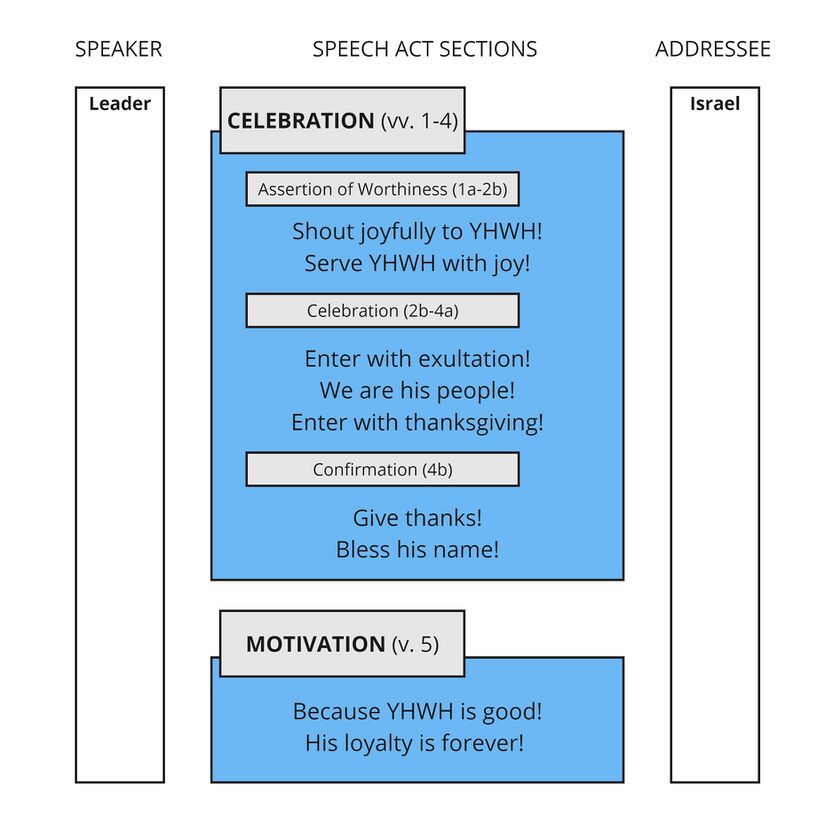Psalm 100 Speech Act
Guardian: Oobie Weinberg
Speech Act Analysis
The Speech Act layer presents the text in terms of what it does, following the findings of Speech Act Theory. It builds on the recognition that there is more to communication than the exchange of propositions. Speech act analysis is particularly important when communicating cross-culturally, and lack of understanding can lead to serious misunderstandings, since the ways languages and cultures perform speech acts varies widely.
For a detailed explanation of our method, see the Speech Act Analysis Creator Guidelines.
Speech Act Analysis Chart
The following chart is scrollable (left/right; up/down).
| Verse | Hebrew | CBC | Sentence type | Illocution (general) | Illocution with context | Macro speech act | Intended perlocution (Think) | Intended perlocution (Feel) | Intended perlocution (Do) |
| Verse number and poetic line | Hebrew text | English translation | Declarative, Imperative, or Interrogative Indirect Speech Act: Mismatch between sentence type and illocution type |
Assertive, Directive, Expressive, Commissive, or Declaratory Indirect Speech Act: Mismatch between sentence type and illocution type |
More specific illocution type with paraphrased context | Illocutionary intent (i.e. communicative purpose) of larger sections of discourse These align with the "Speech Act Summary" headings |
What the speaker intends for the address to think | What the speaker intends for the address to feel | What the speaker intends for the address to do |
If an emendation or revocalization is preferred, that emendation or revocalization will be marked in the Hebrew text of all the visuals.
| Emendations/Revocalizations legend | |
|---|---|
| *Emended text* | Emended text, text in which the consonants differ from the consonants of the Masoretic text, is indicated by blue asterisks on either side of the emendation. |
| *Revocalized text* | Revocalized text, text in which only the vowels differ from the vowels of the Masoretic text, is indicated by purple asterisks on either side of the revocalization. |
| Verse | Text (Hebrew) | Text (CBC) The Close-but-clear translation (CBC) exists to provide a window into the Hebrew text according to how we understand its syntax and word-to-phrase-level semantics. It is designed to be "close" to the Hebrew, while still being "clear." Specifically, the CBC encapsulates and reflects the following layers of analysis: grammar, lexical semantics, phrase-level semantics, and verbal semantics. It does not reflect our analysis of the discourse or of poetics. It is not intended to be used as a stand-alone translation or base text, but as a supplement to Layer-by-Layer materials to help users make full use of these resources. | Sentence type | Illocution (general) | Illocution with context | Macro speech act | Intended perlocution (Think) | Intended perlocution (Feel) | Intended perlocution (Do) | Speech Act Notes | |||
|---|---|---|---|---|---|---|---|---|---|---|---|---|---|
| 1a | מִזְמ֥וֹר לְתוֹדָ֑ה | A psalm for a thank offering. | [Superscription] | ||||||||||
| 1b | הָרִ֥יעוּ לַ֝יהוָ֗ה כָּל־הָאָֽרֶץ׃ | Shout joyfully to YHWH, all the earth! | Imperative | Assertive | Asserting that YHWH is worthy of the joyful shouts of all the earth (see notes below). | Asserting YHWH's worthiness to be praised | Asserting that YHWH is a good master who is worthy of praise | Celebrating | Leading Israel in the performance of a thanksgiving ceremony, centred around celebrating the covenant relationship between YHWH and his people. | Audience will recognize the kingship of YHWH and his worthiness of praise. | Audience will feel enthusiasm towards YHWH and his kingship. | Audience will shout joyfully to YHWH and celebrate his kingship. | • The verb הָרִיעוּ ""shout joyfully"" implies the celebration of a king (cf. 1 Sam 10:24). The assertion that YHWH is worthy of joyful shouts is then asserting to Israel YHWH's worthiness as king. • For further discussion of the indirect speech act of v. 1b, see note here. - The verb הָרִיעוּ ""shout joyfully"" implies the celebration of a king (cf. 1 Sam 10:24). The assertion that YHWH is worthy of joyful shouts is then asserting to Israel YHWH's worthiness as king |
| 2a | עִבְד֣וּ אֶת־יְהוָ֣ה בְּשִׂמְחָ֑ה | Serve YHWH with joy! | Imperative | Directive | Exhorting Israel to a posture of joyful submission to YHWH | Audience will recognize YHWH as a good master worthy of worship and service. | Audience will feel joy in serving YHWH | Audience will commit to serve and worship YHWH as their master | The combination of עִבְדוּ (serve) with שִׂמְחָה (joy) implies service/submission to YHWH not out of fear, but because he is a good master. This imperative also implies then asserting YHWH's worthiness as a good master | ||||
| 2b | בֹּ֥אוּ לְ֝פָנָ֗יו בִּרְנָנָֽה׃ | Enter before him with exultation! | Imperative | Directive | Exhorting Israel to joyfully enter into YHWH's presence | The exhortation to joyfully (not fearfully!) draw near implies celebrating the goodness of that master | Celebrating the covenant relationship between YHWH, the good master, and his people Audience will feel joyful exultation | Audience will draw near to YHWH and enter the sanctuary | |||||
| 3a | דְּע֗וּ כִּֽי־יְהוָה֮ ה֤וּא אֱלֹ֫הִ֥ים | Acknowledge that YHWH, he is God. | Imperative | Directive | Exhorting Israel to acknowledge that YHWH is the one true God | Celebrating Israel's intimate covenant relationship to YHWH, their good master to whom they belong and who shepherds them | Audience will acknowledge that YHWH is the one true God and creator of all things | Audience will feel reverance and awe at their God | Audience will declare and commit to exclusive recognition of YHWH as the one true God and creator | ||||
| 3b | הֽוּא־עָ֭שָׂנוּ *וְל֣וֹ* אֲנַ֑חְנוּ | He has made us, and we are his, | Declarative | Assertive | Celebrating that the one true God is also Israel's maker | Audience will recognize YHWH is their creator | Audience will feel joy and a sense of belonging towards YHWH | ||||||
| 3c | עַ֝מּ֗וֹ וְצֹ֣אן מַרְעִיתֽוֹ׃ | his people and the flock of his pasture. | Declarative | Assertive | Celebrating Israel's covenant relationship with YHWH, the shepherd who cares for them. | Audience will recognize their identity as YHWH's people | |||||||
| 4a | בֹּ֤אוּ שְׁעָרָ֨יו ׀ בְּתוֹדָ֗ה | Enter his gates with thanksgiving, | Imperative | Directive | Exhorting Israel to joyfully enter into YHWH's temple courts | The repeated exhortation (cf. v. 2b) to draw near to YHWH with joy and thanksgiving reflects further celebrating of his goodness and worthiness | Audience will feel thankful and worshipful | Audience will draw near to YHWH and enter through the gates and courts | |||||
| 4b | חֲצֵרֹתָ֥יו בִּתְהִלָּ֑ה | his courts with praise. | |||||||||||
| 4c | הֽוֹדוּ־ל֝֗וֹ | Give thanks to him! | Imperative | Directive | Exhorting the Israel to give thanks to YHWH | Exhortating to celebrate YHWH's goodness through thanksgiving and blessing | Confirming YHWH's goodness | Audience will feel thankful | Audience will give thanks to YHWH | ||||
| 4d | בָּרֲכ֥וּ שְׁמֽוֹ׃ | Bless his name, | Imperative | Directive | Exhorting the Israel to bless YHWH's name | Audience will bless YHWH | |||||||
| 5a | כִּי־ט֣וֹב יְ֭הֹוָה | for YHWH is good, | Declarative | Assertive | Grounding call to thank and bless (v. 4b-c) and all preceding statements in YHWH's goodness and loyalty | Justifying all preceding speech acts in YHWH's goodness, loyalty, and faithfulness | Providing the motivation for the preceding assertion (1b-2a), celebration (2b-4a), and confirmation (4b). | Providing Motivation | Audience will recognize the goodness and eternal loyalty and faithfulness of YHWH | Audience will feel thankful, joyful and confident in YHWH's goodness | |||
| 5b | לְעוֹלָ֣ם חַסְדּ֑וֹ | his loyalty is forever, | Declarative | Assertive | Grounding call to thank and bless (v. 4b-c) and all preceding statements in YHWH's faithfulness | ||||||||
| 5c | וְעַד־דֹּ֥ר וָ֝דֹ֗ר אֱמוּנָתֽוֹ׃ | and his faithfulness continues through generation after generation. | |||||||||||


